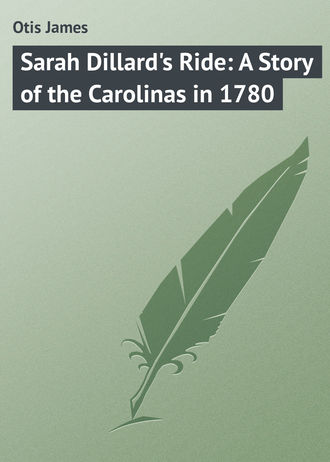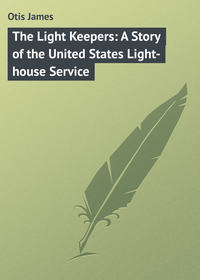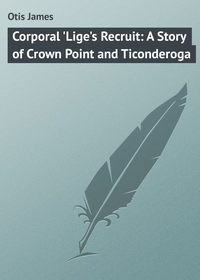 полная версия
полная версияSarah Dillard's Ride: A Story of the Carolinas in 1780

James Otis
Sarah Dillard's Ride: A Story of the Carolinas in 1780
NOTE
"They were men admirably fitted by their daily pursuits for the privations they were called upon to endure. They had neither tents, baggage, bread, nor salt, and no commissary department to furnish regular supplies. Potatoes, pumpkins, roasted corn, and occasionally a bit of venison supplied by their own rifles, composed their daily food. Such were the men who were gathering among the mountains and valleys of the Upper Carolinas to beat back the invaders." —Lossing's "Field-Book of the Revolution."
CHAPTER I.
A BRITISHER'S THREAT
In the year 1780 there was in North Carolina, west of Broad River, and near the site of what is now known as Rutherfordton, a settlement called Gilbert Town.
Within five or six miles of this village on a certain September day in the year above mentioned, two lads, equipped for a hunting trip, had halted in the woods.
One was Nathan Shelby, a boy sixteen years of age, and nephew of that Isaac Shelby whose name is so prominent in the early history of North Carolina; the other, Evan McDowells, son of Colonel Charles McDowells, was one year younger than Nathan.
But for the fact that these two lads were sorely needed at their homes, both would have been enrolled either among the American forces, or with those hardy pioneers who were then known as Mountain Men, for the time was come when the struggling colonists required every arm that could raise a musket.
On the previous month the American forces under General Gates had been defeated by Cornwallis at Camden. Tarleton had dispersed Sumter's forces at Rocky Mount, and the southern colonists appeared to have been entirely subdued by the royal troops.
General Cornwallis, now at Camden, was bending his efforts to establish the king's government in South Carolina, and in punishing those "rebels" who, despite their many reverses, were yet among the mountains awaiting a favorable opportunity to strike another blow in behalf of freedom.
It was at this time, and especially in the Carolinas, as if the attempt to free the colonists from the oppressive yoke of the British had utterly failed, and even the most sanguine despaired of being able to accomplish anything in that section until General Washington should lend them some assistance.
Nathan and Evan, lads though they were, understood full well the situation of affairs, and as they sat upon the trunk of a fallen tree, resting from the labor of seeking food – for this hunting trip had been made for serious purposes, rather than in pursuit of sport – the two spoke concerning the reverses which had been visited upon the patriots.
"It is as if we were already whipped into submission," Evan said sadly, "for how is it possible our people shall gather in such force as to be able to offer successful resistance?"
"That seems indeed true," Nathan replied, "and yet will Colonel William Campbell of Virginia remain idle? Do you believe my uncle, Colonel Shelby, or Lieutenant-Colonel John Sevier, have laid down their arms? Or even if those three are subdued, is it likely, think you, that your father will rest content while the king's forces overrun the country at their pleasure?"
"There are matters which cannot be mended, however brave men may be, and it seems to me that now has come the time when we must say that the struggle for liberty can no longer be continued."
"If all who have for four years opposed the king's will were as faint-hearted as you, Evan, then indeed had the rebellion been crushed before it was well begun."
"But tell me, Nathan, how may the Americans, with but few men, scanty equipments, and little or no money, even attempt to hold their own against the royal forces, which outnumber us mayhap ten to one?"
"That I cannot do, and perchance even your father might find it difficult to make reply to such question, but this much I believe to be a certainty. The desire for freedom has not been crushed out from the hearts of the American people, and while it remains strong as at present, some way will be found whereby we shall have at least the semblance of an army again."
"I would I could believe you."
"Is your mother thus despondent?"
"I cannot say, Nathan. It is now near two weeks, as you know, since I have seen her."
"But think you she has lost all hope? She, who has dared to burn charcoal in the fireplace of her own home, while the Britishers were about, in order to carry it to your father, who was making gunpowder in a cave among the mountains."
"My mother is brave, which is more, mayhap, than can be said for her son."
"Ay; had she not been, when your father's cattle were driven off by the British skirmishers, she had hardly called the neighbors together, and by such show of strength recovered the property. With women like your mother, and men such as your father and my Uncle Isaac, I tell you, Evan, the cause of liberty is not lost."
"But it would seem as if we were further from our purpose now than four years ago, when a declaration of our independence was read throughout the colonies. Then we had more money, and it was not as difficult to find recruits. Now ten dollars in paper is hardly worth two cents – in fact, I am told that even the troops consider it too cumbersome for its value to repay them for carrying it around."
"That is the case only with the paper money."
"Ay, Nathan; and as for gold and silver, we still trust to that on which is stamped the king's image. But it is not for you and I to talk of political matters, when both are really in the same way of thinking; the only difference between us is that I, who was never so courageous as you, have grown faint-hearted."
Evan ceased speaking very suddenly, for at that instant both the lads heard the hoof-beats of horses in the distance, and started up in what was very like alarm as they listened, while exchanging inquiring glances.
"It must be that the British are coming this way," Evan said, turning as if to flee; but his companion clutched him by the arm, saying with a laugh:
"You are grown timorous indeed, Evan, if you can imagine that noise to be caused by the redcoats. Surely there are none nearabout here, and even though there were, it is not likely they would attempt to make their way through this wood."
Evan ceased his efforts to flee, but turned as if unwilling, with a forced smile upon his face.
"Of course it must be as you say, Nathan, for the Britishers would have no business here; yet it is even true they may be nearabout, for we have heard that General Cornwallis was bent on sending a force into this section, and he is not wise who refuses to take heed of any warning in these times."
"You need not set me down as one who makes light of the information which has been brought by those whom we could trust; but I refuse to be alarmed without cause, and the idea that the Britishers would ride into this thicket is – They are redcoats! It is I who am playing the fool by setting myself up as an authority on those matters of which I know nothing!"
The foremost of a mounted band had come into view, causing this sudden change in Nathan's speech, and the two boys gazed in alarm at the rapidly advancing horsemen, for now was it too late to make any attempt at flight. Both knew, from reports which had been spread through the country, of outrages committed among even those who were not in arms, what it might mean to fall into the hands of the enemy, who were bent on subjugating the country by any means, however harsh, and they had good reason to expect brutal treatment once they were caught in the clutches of the king's troops.
Involuntarily the lads clasped hands. Although armed, there was no thought in the mind of either that resistance might be offered, and indeed it would have been in the highest degree foolhardy to have done other than they did at this moment – quietly await that foe from which escape was impossible.
Where they stood the forest was open and free from underbrush, therefore while the troopers were yet a quarter of a mile away they were in full view, their red coats showing in vivid contrast among the green leaves, and before the advance squad were yet arrived at where the boys were standing, the entire company could be seen.
Fully two hundred men, a goodly portion of whom were Tories, clad in the ordinary garb of the country, and the remainder wearing the king's uniform, made up the party.
Among the foremost of the riders was one clad in the habiliments of a major, and from what had been told by those who brought the information of General Cornwallis' movements, the boys knew at once that this must be Patrick Ferguson of the Seventy-first Royal Regiment.
It was this officer who accosted the frightened lads, by asking in a loud voice which had in it much of menace:
"What are you two doing here armed? Rebel spawn no doubt, who lie in wait to do mischief when it may be accomplished without danger to yourselves."
"We are out hunting, and if it please you, sir, in order to get meat for the family," Nathan replied, speaking stoutly, although he was inwardly quaking with fear.
"Tell me no lies or it shall go the worse with you. How long has it been that you of the Carolinas must search for food in the forests?"
"Since his majesty's troops overrode the colony, quartering themselves upon those whose store of provisions was already scanty."
"Be careful how you speak! I am not in a mood to hear insolence from those who rebel against their lawful king," and the major made a threatening gesture, bending from his horse as if he would strike the boys.
Evan stepped back a pace in fear; but Nathan boldly held his ground as he asked bravely:
"Think you, sir, that two lads like us may do the king harm?"
Major Ferguson's face reddened with rage, and motioning for one of the troopers to advance, he said:
"Disarm and bind these insolent cubs who dare bandy words with their betters. They shall talk in a different strain before I am done with them."
"Would you make prisoners of us who are not soldiers?" Nathan asked even as the man seized him by the arm. "Would you carry away from their homes two boys upon whom a family is depending for food?"
"Where are your fathers?" Major Ferguson asked sharply.
"I have none," Nathan replied. "My mother is a widow."
"And yours?" he continued, turning toward Evan.
"Colonel Charles McDowells."
"As rank a rebel as lives in the Carolinas. See that you bind them well, my man, for I doubt not these two, innocent as they would appear, have already had their fingers in the rebel broth."
"Since you are bent on making us prisoners, sir, it is useless to deny that we have done aught against the king, save it be a crime to perform our share in feeding those dependent upon us."
"If those who make up the ragamuffin following of Mister Washington could not depend on such as you to provide for the women and children, they might be forced to remain at home where they belong, instead of hatching treason, and I could then, perhaps, clear this portion of the colonies of every male inhabitant who is old enough to be of service in any capacity. Before I have performed my mission you of the Carolinas shall understand what rebellion means, for it is my purpose to teach you a lesson."
Having said this the valiant major turned his horse that he might speak with some of his followers, and the trooper who was bidden to disarm and bind the lads had well-nigh finished with the task.
Nathan and Evan were rudely searched, and with such effect that even their spare flints were taken from them. Their hands were bound behind their backs securely with leathern straps; the fowling pieces and the scanty store of ammunition were taken charge of by one of the troopers, and he who had been detailed to seize them stood as if awaiting orders of his commander.
"Keep up a brave heart, Evan," Nathan whispered courageously. "Do not give yonder redcoated brute the satisfaction of seeing that we are afraid."
"We are likely to be carried very far from home, Nathan, and it may be that much suffering is in store for us."
"Of that there can be little doubt; but no good will come to us by showing the white feather, for of how much weight, think you, tears and prayers be upon such as our captor. It would please him were we to give free rein to our sorrow, and I am not minded he shall have such gratification from me."
"But surely there is no reason why you should anger him by bold speaking – that will not avail us."
"No more than it would if we pleaded for mercy, and there is much satisfaction to be gained by depriving him of the pleasure that would come with the sight of our tears. Hold firm, Evan McDowells, as your father and your mother would do were they in like situation, and mayhap the time will come when this Major Ferguson's grasp will be so far lessened that we shall see a chance of slipping through his fingers."
"I have little hope of any such good fortune," Evan replied, with a long-drawn sigh, and then both the boys fell silent.
The horsemen had dismounted, and it was evident that a prolonged halt would be made.
The major gave no further orders concerning his prisoners, and the trooper stood guard over them four or five paces away, giving no apparent heed to the conversation in which they had been indulging.
During half an hour the situation remained unchanged, and then came into view two hundred or more men on foot, the greater number wearing scarlet uniforms, the remainder being evidently Tories.
At first glance the boys believed this last body of Britishers had come by accident upon the halting-place; but as the men exchanged salutations with the members of the advance party, it could be seen that they all formed one company under the leadership of Major Ferguson, and had been temporarily separated because of the more rapid traveling of the horsemen.
When another half-hour had been spent here the order was given to resume the march, and an officer in the uniform of a captain brought word from the major to the man who was guarding the boys, that he would be relieved from duty, one of the foot-soldiers taking his place.
When the change of guards had been effected, Nathan and Evan were ordered into line midway of the column, and thus hemmed in on every side they were forced to advance, traveling with difficulty, and even pain, because their arms were fettered.
As a rule, the men gave very little attention to these young prisoners, save when one or the other of the boys fell slightly in the rear, and then a blow from the butt of a musket would warn him that he must keep pace with the remainder of the troop or suffer because of inability to do so.
Now that the lads were completely surrounded by foes, no conversation of a private nature was possible, and in silence they marched on, with ample food for unpleasant thoughts.
The only question in the minds of both was as to the destination of this body of Britishers, for there seemed little reason why so many men should penetrate this mountainous portion of the Carolinas, where there was no important stronghold to be captured.
Until five o'clock in the afternoon the troop advanced steadily, and then the foot-soldiers were arrived at a small valley where the horsemen had already apparently halted for the night.
Fires were kindled here and there; some of the soldiers were engaged in cooking, others in caring for the horses, and all so intent upon making themselves comfortable that it was as if the prisoners had been forgotten by everyone save him who was charged with their custody.
When an hour had passed the lads were still standing where they had been halted, and Nathan said with a mirthless laugh:
"It looks as though we might be forced to keep our feet until morning, for so nearly as I can make out food has been served to all save ourselves and our guard."
"I am counting on being relieved before many more moments pass," the soldier said petulantly, for Nathan had spoken so loudly that he could not fail to hear the remark.
"And are we to be starved because we neither wear red coats nor are willing to march shoulder to shoulder with them?"
"It matters not to me what disposition may be made of you, so that I am given an opportunity of getting my rations," the soldier said, and a moment later one of his comrades came up, musket in hand, to relieve him.
To this last guard Nathan repeated his question as to the probability of their being provided with supper, and the soldier replied carelessly:
"I am not the quartermaster of this detachment, and if I was I question whether much time would be spent over such as you."
Then he fell to pacing to and fro, watching his comrades as they lounged around the campfire; but all the while keeping close guard over the two lads, who were so weary from the hunting of the forenoon and the march of the afternoon that it is questionable whether they could have fled even if the opportunity presented itself.
"I had expected to be ill-treated," Nathan said with an assumption of carelessness to his comrade; "but did not count on being starved. It is a pity, since we were to be made prisoners, that this gallant Major Ferguson could not have come up after we had partaken of dinner, for it seems as if many hours had passed since we ate breakfast."
Evan was on the point of making some reply to this mournful remark when from the distance he observed a lad, who, coming directly across the valley, was halted by the sentinels stationed around the encampment.
"Look there!" he said, in a low tone of excitement. "If I mistake not, it is Ephraim Sowers, and what may he be doing here among the redcoats?"
"It is as I have always believed," Nathan cried, forgetting that the man who acted as their guard could hear every word he spoke. "Ephraim is neither more nor less than a Tory, and I venture to say he comes now to give information concerning our friends."
"It is not the first time he has met this detachment of men," Evan added, "See! He speaks now with one of the soldiers as to an old acquaintance."
"Who may say for how long he has acted the spy? When it was told on the day before yesterday that he had gold in his possession, I would not believe it; but now it is plain to be seen that there was truth in the statement, and we can say how he earned it."
This Ephraim Sowers was the son of one who claimed to be "a man of peace;" one who by many a loud word had declared that he believed it a sin to resort to arms, whatever the provocation, and, living a near neighbor to the McDowells, was in a position, if it so pleased him, to give much of valuable information to the enemy. Until this moment, however, there had been no suspicion that he might be tempted to play the part of spy, and his son's arrival at this encampment told the boys as plainly as words could have done how it was General Cornwallis had reliable knowledge concerning that portion of the colony, for he had given good proof that he knew who among the inhabitants favored the king or the "rebels."
Ephraim advanced leisurely, and with the air of one who believes he is expected, until his eyes rested upon the prisoners; then he started suddenly, a flush as of shame came over his face for the instant, and straightening himself defiantly, he walked up with a vindictive smile until he was within half a dozen paces of the two lads.
"I had thought that the sight of a redcoat was so displeasing that it went against your stomachs," he said tauntingly, "and yet I find you hobnobbing with Major Ferguson's men."
"It seems that you know who commands this detachment," Evan said sternly, forgetting all his fears now in the anger he felt that this lad whom he had once trusted should have been all the while a Tory.
"I'll warrant you two know as much."
"Ay; but we are here as prisoners, and you have come as a visitor – one who has seen these men before, to judge from the manner in which you accosted them."
"Well, what does that prove?" Ephraim asked, an evil look coming into his eyes.
"It proves you to be a spy, and when we shall make known what has been seen this night, I am thinking neither you nor your peace-loving father will find the Carolinas a pleasant abiding place."
"And I am thinking that when such rebels as you have the chance to tell what has been seen, the rebellion will have been crushed out, for now that you are here, if my words go for anything, you will not soon be set at liberty."
CHAPTER II.
THE TORY'S PURPOSE
Until the moment when Ephraim Sowers had revealed his true self by coming into the British camp as a spy, neither Nathan nor Evan had felt any grave anxiety regarding the future.
They knew full well that the redcoats were not given to being friendly in their intercourse with the so-called rebels, and that such persons as they took were treated with roughness, if not absolute harshness.
Such treatment as had previously been dealt out to captured Americans the boys could endure without a murmur, therefore there was no painful anxiety regarding the outcome of the matter; but when Ephraim Sowers appeared, the situation of affairs seemed to be decidedly changed.
Now that he had been recognized by these two, the news that he was a Tory and in league with the Britishers would be carried to all that country roundabout where he lived, whenever Nathan and Evan were set free.
It was only reasonable to suppose he had some slight degree of influence in the camp, having served Major Ferguson as a spy, and these two lads might safely count on his doing whatsoever was in his power to have them held prisoners, even if worse did not follow, and it was evident Nathan feared this last possibility, for he said in a low tone to his comrade, when the young Tory had walked away with a swagger in the direction of Major Ferguson's tent:
"No good will come to us through having seen that villain."
"On such a point there need be little discussion, for I am of the same mind, and it will be exceedingly fortunate if he leaves this encampment without having worked us some harm, although I cannot say in what way it might be done."
"For his own safety, should he ever count on returning home, we must be silenced, Evan, and I am thinking Ephraim Sowers knows in this encampment enough of his own kidney who would aid him in thus doing."
"Do you mean that he would dare to kill us?" and now Evan looked up in alarm.
"He would dare do anything when there was no danger of his receiving bodily injury. But don't let me play upon your fears, for there is no reason why we should look abroad for trouble when we have sufficient of it close around us. We will trust to the chances that that young Tory is powerless, or too much occupied just at present, to give evil heed to us."
"The last is what we should not take into consideration, for however actively engaged he may be it is necessary for his own safety, should he ever return among his neighbors, to prevent us from telling what we have just learned."
"If you refuse such comfort as I try to give, then we will put it that he will be content so long as we are held prisoners here, and who shall say that we may not soon find an opportunity for escape? Captives while on the march are not like to be kept under overly strict guard."
"Where did the Tory go? I was so bewildered both by seeing him here and realizing what his coming might mean, as to be almost in a daze while he was making his threats."
"I fancied I saw some one nearabout Major Ferguson's tent beckoning for the scoundrel, and he hurried away as if bent on visiting the commander. I venture to predict we shall see him again before he leaves this locality."
Then the lads fell to speculating as to how long young Sowers had been engaged as a British spy; what might be the result of Major Ferguson's march through the mountains, and in other ways discussing the situation as if they were to be spectators rather than participants in whatever might occur.
When half an hour had passed, much to their surprise, for the boys had come to believe they would not be given food that night, rations were served out to them, and they were partaking of the limited meal with such keenness of appetite and eagerness as to be unaware of Ephraim Sowers' return until he stood close beside them.









